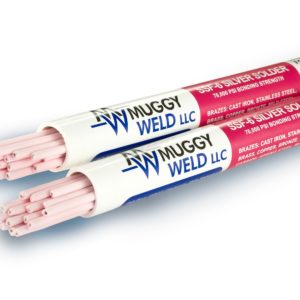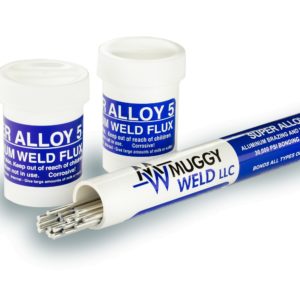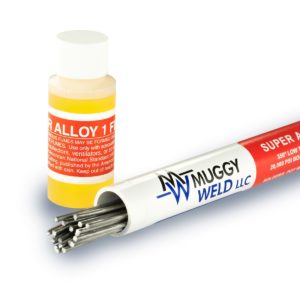Early trans-Atlantic ship travel was performed by sailboat until the early 1800s, when boat propellers were invented. Boat propellers are metal devices submerged below water that are designed to move water in a screw shaped motion, creating thrust and propelling the boat forward. Originally constructed of wood, then brass or bronze, modern boat propellers are constructed of lightweight, inexpensive aluminum.
Why is brazing aluminum boat propellers important?
Aluminum, while lighter and faster than brass or bronze, is also more easily damaged due to the softer nature of the metal. In fact, propellers are designed to be sacrificial lambs in case of accidental grounding. Cuts, scrapes, and dings are common occurrences for the average aluminum boat. For this reason, brazing aluminum boat propellers is a worthwhile skill for any boater to learn.
In this video, we share step by step instructions for brazing aluminum boat propeller damage with Super Alloy 5 aluminum repair kit.
Notes Before Brazing:
Oxyacetylene or another oxygen-fueled torch is required when working on any aluminum boat or large mass of aluminum, to keep the base metal at the proper working temperature. Propane torches will not heat and sustain the parent metal to 600°F.
Remove any debris from the propeller prior to beginning the repair.
Aluminum Boat Brazing Technique
Utilizing an oxyacetylene torch, keep the heat moving, but concentrate the torch tip on the repair area to bring the aluminum up to temperature. Apply the flux as instructed and watch for the thin and watery appearance, then lay the rod into the damaged aluminum, continuing to move the brazing torch. Back and forth, rod and flux, flowing out the filler rod by moving the torch and the flux the direction you want the material to flow.
If the rod balls up, the base metal is too cold. Knock the ball off and start again.
Notice how close the size 2 tip is held to the repair area, while still moving in a circular motion. This technique concentrates the flame and ensures the cracked area stays hot enough to flow the rod without burning a hole in the aluminum.
The finished repair is cooled naturally and then shaped with a grinder. Good as new, a perfect color match, and strong as the parent metal.
Disclaimers:
Please visit https://www.aws.org/Standards-and-Publications/Free-Resources/#YourResources prior to using Muggy Weld products, and adhere to all AWS welding safety guidelines.
Further product safety information is available at http://muggyweld.com/safety-guidelines
Muggy Weld LLC shall not be liable for any loss, injury, claim, liability, or damage of any kind resulting in any way from (a) your use of this Site, (b) any services or products obtained from this Site, (c) any errors in or omissions from this Site, (d) the unavailability or interruption of this Site or any features thereof, (e) any content contained on this Site.
MSDS sheets available with purchase from MuggyWeld.com, upon request.
Check Out These Products
-

SSF-6 Silver Solder Rod: Flux-Coated SSF-6 56% Brazing Rod
$69.00 – $260.00High-Strength, 56% Silver Solder Rod🌡 Melting Temperature 1150 / 621 ⇄︎ Bonding Strength 70000 psi, 482.63 MPa 🔧︎ Sizes Available (in) 1/16 🔧︎ Sizes Available (mm) 1.58 -

Super Alloy 5 Aluminum Welding and Brazing Rod
$69.00 – $109.00600°F aluminum welding, brazing, and soldering rod. Ideal for aluminum boat repair and cast aluminum.🌡 Melting Temperature 600 / 317 ⇄︎ Bonding Strength 30000 psi, 206.84 MPa

